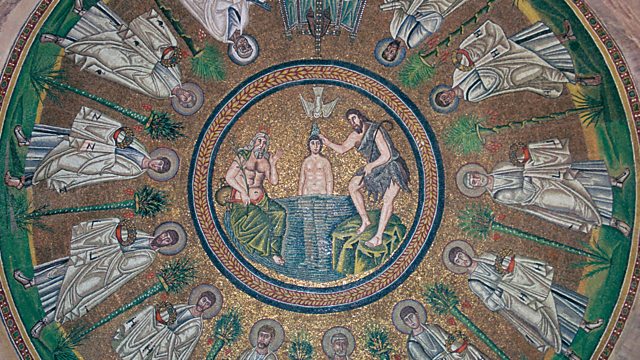Arianism
Melvyn Bragg and guests discuss a widely shared form of Christianity, followed in the Roman empire and by the Goths across its borders, that became an infamous heresy.
Melvyn Bragg and guests discuss the form of Christianity adopted by Ostrogoths in the 4th century AD, which they learned from Roman missionaries and from their own contact with the imperial court at Constantinople. This form spread to the Vandals and the Visigoths, who took it into Roman Spain and North Africa, and the Ostrogoths brought it deeper into Italy after the fall of the western Roman empire. Meanwhile, with the Roman empire in the east now firmly committed to the Nicene Creed not the Arian, the Goths and Vandals faced conflict or conversion, as Arianism moved from an orthodox view to being a heresy that would keep followers from heaven and delay the Second Coming for all.
The image above is the ceiling mosaic of the Arian Baptistry in Ravenna, commissioned by Theodoric, ruler of the Ostrogothic Kingdom of Italy, around the end of the 5th century
With
Judith Herrin
Professor of Late Antique and Byzantine Studies, Emeritus, at King's College London
Robin Whelan
Lecturer in Mediterranean History at the University of Liverpool
And
Martin Palmer
Visiting Professor in Religion, History and Nature at the University of Winchester
Producer: Simon Tillotson
Last on
More episodes
Previous
LINKS AND FURTHER READING
READING LIST
Lewis Ayres, Nicaea and its Legacy: An Approach to Fourth-Century Trinitarian Theology (Oxford University Press, 2004)
Hilaire Belloc, The Great Heresies (Sheed and Ward, 1938)
Guido Berndt and Roland Steinacher (eds), Arianism: Roman Heresy and Barbarian Creed (Routledge, 2014)
Virginia Burrus, 'Begotten, Not Made': Conceiving Manhood in Late Antiquity (Stanford University Press, 2000), especially ch. 1
Bart D. Ehrman, The Triumph of Christianity (One World, 2018)
R.P.C. Hanson, The Search for the Christian Doctrine of God: The Arian controversy 318–381 (Baker Academic, 2006)
Susan Ashbrook Harvey and David Hunter (eds), The Oxford Handbook of Early Christian Studies (Oxford University Press, 2008), especially 'Arius and Arians' by J. Rebecca Lyman
Judith Herrin, The Formation of Christendom (Basil Blackwell, 1987)
Judith Herrin, Ravenna: Capital of Empire, Crucible of Europe (Allen Lane, 2020)
Young Richard Kim (ed.) The Cambridge Companion to the Council of Nicaea (Cambridge University Press, 2021)
Ellen Muehlberger, 'The Legend of Arius' Death: Imagination, Space and Filth in Late Ancient Historiography' (Past & Present 227, 2015)
Geza Vermes, Christian Beginnings from Nazareth to Nicaea AD 30 – 325 (Penguin, 2013)
Robin Whelan, Being Christian in Vandal Africa: The Politics of Orthodoxy in the Post-Imperial West (University of California Press, 2018)
Rowan Williams, Arius: Heresy and Tradition (SCM Press, 2002)
RELATED LINKS
Broadcasts
- Thu 15 Apr 2021 09:00Βι¶ΉΤΌΕΔ Radio 4
- Thu 15 Apr 2021 21:30Βι¶ΉΤΌΕΔ Radio 4
Featured in...
![]()
Ancient Rome—In Our Time
Browse the Ancient Rome era within the In Our Time archive.
![]()
Religion—In Our Time
Discussion of religious movements and the theories and individuals behind them.
In Our Time podcasts
Download programmes from the huge In Our Time archive.
The In Our Time Listeners' Top 10
If you’re new to In Our Time, this is a good place to start.
Arts and Ideas podcast
Download the best of Radio 3's Free Thinking programme.
Podcast
-
![]()
In Our Time
Melvyn Bragg and guests discuss the ideas, people and events that have shaped our world.



